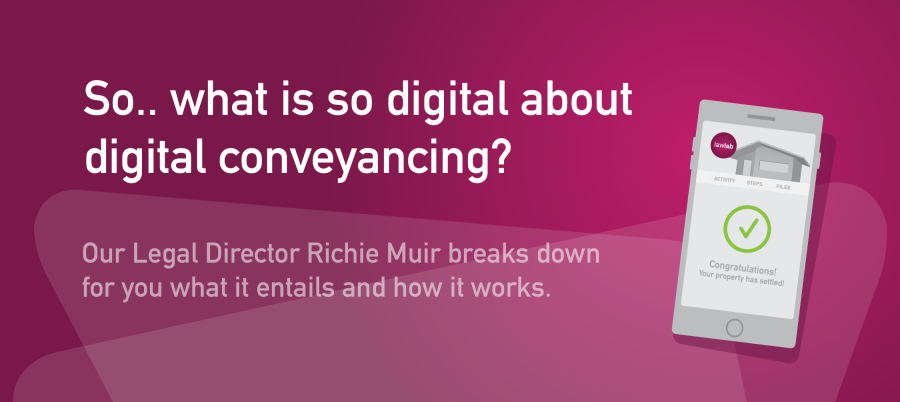Thanks to mobile phones and wireless internet, you can access almost anything from the palm of your hand. However until very recently the property conveyancing process has hardly changed in a hundred years. Now you can buy and sell a property and complete the conveyancing process from the comfort of your own home using a digitial conveyancing service.
The difference between traditional conveyancing and digital conveyancing services.
In a digital conveyancing service, your home purchase or sale transaction will usually be easier and quicker. It’s easier because instead of having to visit your conveyancer’s office or constantly calling their office expecting a call back for an update, you will be able to get immediate updates on your transaction as they happen. It’s quicker because instead of having to wait for documents to arrive in the post, you will have access to them as soon as they are prepared.
The term ‘digital’ can be confusing or scary for some but it shouldn't be. A digital conveyancing service essentially means that the conveyancing service is provided and delivered to you using computer technology, for example using emails or secure access to an online platform, instead of meeting face to face or sending documents by post.
Behind the computer technology are real lawyers or conveyancers providing legal advice in the most convenient way possible. All you need is an email address and internet access. Some online platforms enable you and your other professional advisors, for example your real estate agent or mortgage broker, to collaborate with your conveyancing lawyer in a digital environment, sharing messages and documents with each other. Other online platforms enable you to sign contracts using a digital signature.
What is a digital signature?
Signing contracts with a digital signature is legally valid and becoming more and more popular in the real estate and legal industries. To sign a contract digitally you would usually click on a link emailed to you from the person sending the contract and then follow the step by step prompts to sign the contract. You would usually have the option of applying your signature to the contract using your mouse on your computer or a stylus pen on your smartphone or tablet, or even easier by choosing a stylised version of your printed name.
To make sure it is you who has signed the contract, the digital contract signing software will record the email the contract was sent to, the time it was signed, the IP address (i.e. computer’s unique identity) and your geographical location. This can be used as evidence if somebody claimed they did not sign the contract and is arguably more secure than traditional ways of signing and witnessing paper contracts.
What is electronic settlement?
A digital conveyancing experience can be completed by an electronic settlement. A settlement is when each party’s obligations in the contract are completed, e.g. payment of the price in exchange for the title to the property. Traditionally settlements were done by paper and a representative of each party (buyer, seller, incoming and outgoing banks) had to physically attend settlement to swap documents and bank cheques.
Electronic settlements are usually a better experience because there is less likelihood of delays and mistakes that inevitably happen in paper settlements. Some of the benefits for sellers include getting access to funds on the same day (instead of having to wait for cheques to clear), and having less documents to sign. Buyers will also have the title transferred to the name much quicker, thereby reducing risk. Electronic settlements are compulsory in some states and are being rolled out in other states.
Is digital conveyancing secure?
There needs to be appropriate checks and balances in digital conveyancing. For example, each party to a transaction must first have their identity verified face to face and with original identity documents. This requirement ensures that the digital conveyancing service provider is dealing with the right person or persons. Home buyers and sellers using digital conveyancing services should create a unique password when logging into the digital platform and should not share their password with anyone. The best digital conveyancing providers have bank grade security platforms which means your personal information is kept safe and secure. There are more instances of fraud reported in paper conveyancing transactions than in digital conveyancing transactions.
Is digital conveyancing the right fit for you?
Lawlab provides a premium digital conveyancing service to a diverse range of clients. Our industry leading digital platform called Rundl makes the conveyancing process easily accessible and understandable for people of any age, background and technological know-how. Even if you don’t have an email or internet access, you may still be able to use lawlab if you authorise a trusted family member or friend who does have an email and internet access to provide instructions on your behalf. Lawlab’s digital conveyancing service is backed up by our friendly legal advisers and support team who will guide you through the whole process step by step and answer any questions you might have.
Lawlab works with thousands of property buyers and sellers every year
We use this experience to make the conveyancing process easier for you.
Get started nowHave any questions?
For more information please call us on 1800 529 522 or send us your enquiry.


